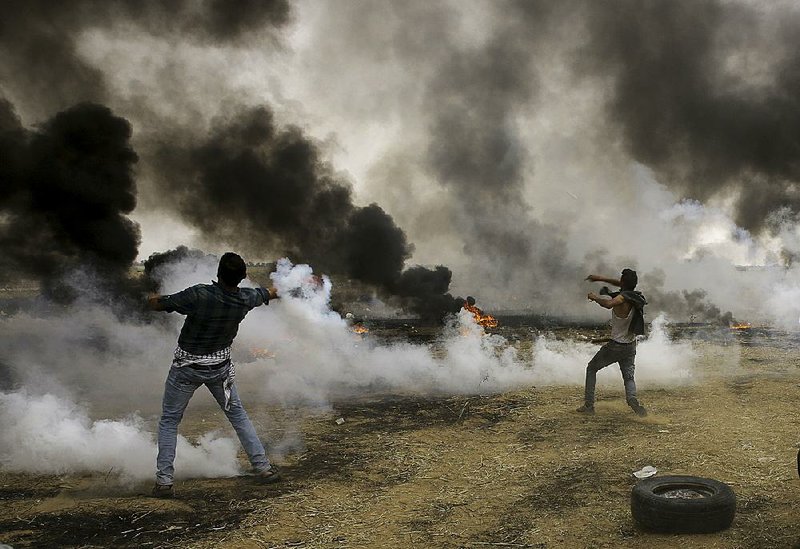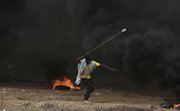GAZA CITY, Gaza Strip -- Black smoke from burning tires mixed with streaks of tear gas fired by Israeli forces Friday as several thousand Palestinians staged a sixth weekly protest on the Gaza-Israel border. At least 70 Palestinians were wounded by Israeli fire, the lowest casualty toll since the protests began.
Hundreds of demonstrators broke into the Gaza side of a cargo crossing with Israel, damaging pipelines that carry fuel and gas into Gaza, the Israeli military said. Photos on social media showed flames near the Kerem Shalom crossing, near where the borders of Gaza, Israel and Egypt converge.
Palestinian officials said protesters smashed some equipment near the crossing but were unaware of any damage to pipelines. The Israeli military called the incident a "cynical act of terror" that harms Gaza civilians.
Elsewhere, witnesses said small Israeli drones faced off against flaming kites that were flown by Palestinians over the border fence in recent weeks to set ablaze dry wheat fields on the Israeli side. The witnesses said two kites with burning rags were taken down by the drones, while two other drones crashed after being hit by stones.
The protests are part of a weekly campaign organized by Gaza's Hamas rulers. The marches each Friday are aimed, in part, at breaking a decade-old blockade of the territory that was imposed by Israel and Egypt after the Islamic militant group took control there in 2007.
The Islamic militant group Hamas has said the protests will culminate in a mass march May 15, with some officials suggesting a possible border breach at the time and others saying the protests might continue beyond that date.
Israel has warned that it will prevent such a breach at any cost.
May 15 is the day Palestinians commemorate their mass uprooting in the 1948 war over Israel's creation. Hundreds of thousands of Palestinians fled or were driven from homes in what is now Israel. Two-thirds of Gaza's residents are descendants of refugees.
Despite the risks faced by the protesters near the border, turnout has been sustained by the widespread desperation of blockade-linked hardships of life in Gaza. Virtually all of the territory's 2 million people are barred from travel, about two-thirds of young people are unemployed and electricity is on only a few hours a day.
On Friday, 229 protesters were hospitalized, including 70 with bullet wounds, the Gaza Health Ministry said. Three of the wounded were in serious condition.
Since late March, 40 Palestinians have been killed and more than 1,700 wounded by Israeli army fire. Friday marked the first weekly protest in which no Palestinians were reported killed by sundown.
Yehiyeh Amarin, 18, said he and his friends will keep going to the border until the blockade has been lifted.
"If no solution happens by May 15, we will continue the protests or we die," he said, as another protester behind him brandished a yellow wire cutter. "We will cut through the fence."
The mounting casualty toll has led to growing criticism of Israel. Rights groups say Israeli open-fire regulations are unlawful because they permit troops to use potentially lethal force against unarmed protesters. Israel's Supreme Court is currently weighing a petition by six rights groups to restrict or ban the use of live fire on the border.
The European Union and the United Nations have also criticized the use of lethal force.
Israel says it is defending its sovereign border, including nearby communities, and that soldiers target only instigators.
Separately Friday, Palestinian President Mahmoud Abbas issued an apology after an uproar over a speech he made this week that was condemned as anti-Semitic and dismissive of Jewish historical connections to the Holy Land.
Palestinian officials said Abbas was under "tremendous" pressure from numerous diplomats and foreign ministers to apologize. The officials spoke on condition of anonymity because they are not authorized to talk to the media.
Abbas, in remarks that were part of a speech to the Palestine Liberation Organization parliament Monday, said it was the Jews' "social function," including money lending, that caused animosity toward them in Europe. He also described the creation of Israel as a European colonial project, saying "history tells us there is no basis for the Jewish homeland."
The Palestinian president's remarks were sharply condemned by the United Nations, European Union, United States, Israel and others as perpetuating anti-Semitic stereotypes and falsifying history.
Information for this article was contributed by Ian Deitch of The Associated Press.
A Section on 05/05/2018


